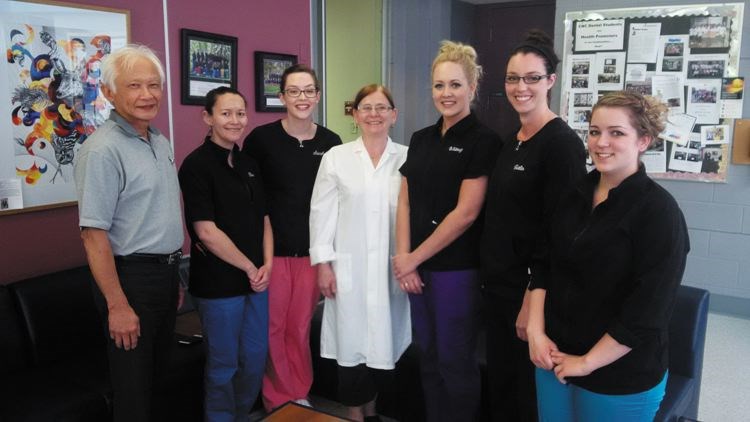A team of Prince George dental students spent three weeks in the Philippines to help a country that is plagued by oral health problems.
The five College of New Caledonia students, alongside instructor and team leader Heather Mohr and local dentist Dr. Wallace Pon gave dental health services to more than 1,000 community members and children in Cebu.
"The majority had tooth decay whether they were children with just primary (teeth) or children that had permanent teeth. Very, very sad," said Mohr, adding part of their efforts focused on training and education with the teachers around brushing and hand washing.
"They're the number one consumers of soft drinks in the world. I was astounded at that," she said.
A 2011 survey found that 87 per cent of the population is suffering from either tooth decay or gum disease, according to the Philippines' Department of Health.
"The oral health status of Filipino children is alarming," its website stated, as well as goal of reducing dental disease by five per cent each year.
For children that number pushes past 90 per cent, Mohr said. A 2006 National Oral health Survey found that 97 per cent of six year olds had tooth decay.
"Any time you have an infection in your mouth, it can affect your whole body," said Mohr, who returned from the trip in early July.
"These are important things for the children, to be able to eat properly, to be able to look good, talk properly and to be pain free."
While tooth decay and gum disease don't directly cause disability, the Department of Health noted, "these conditions can weaken bodily defenses and serve as portals of entry to other more serious and potentially dangerous systemic diseases and infections."
Mohr recounted how one 15-year-old girl had to have all her front teeth removed.
"One of our coordinators in the Philippines said she would never get a job because she didn't have any teeth."
Pon was so moved by that reality, he donated money so she could get dentures. Mohr has other favourite moments, like graduated student Sarah Gagnon's rapport with the children, who ranged from age 4 to 12.
"Just her connection and the way she interacted with the children was really very wonderful to see."
The group also brought items donated by Prince George's dental community, including more than 600 toothbrushes they handed out as part of Canada Day celebrations where they fed 385 children for $200.
"A lot of the children did not even have toothbrushes at home," Mohr said.
Those toothbrushes and toothpaste will be kept at the school, so at the very least, they can brush their teeth once a day.
The trip was more than a humanitarian effort; it was a learning experience for the CNC students who helped provide dental education, hygiene services, restorations, and extractions.
"It's a cultural experience and it's a professional experience, because they get the opportunity to work with different people, with a community with very little health care, and they get the opportunity to utilize their skills in a way they won't always get," said Mohr.
She said she would like to organize a trip to the Philippines every year, but recruitment from smaller classes and the cost - about $5,500 per person - are both barriers.
"Here in Canada we have all of the facilities and the equipment and all the ultra-modern computers and there (you don't). You're down to the very basics."
They worked in portables, schools and clinics in partnership with the Rise Above Foundation Cebu.
"You're providing care right down at grassroots level in communities," she said, adding through Pon, the students were exposed to a number of new procedures including tooth extractions.
Mohr launched the humanitarian program four years ago and has taken students to Tanzania and Peru.
"It was just time for me to give back because I just felt that my profession has given me so much that it was important for me to do something for someone else," she said.

.png;w=120;h=80;mode=crop)

